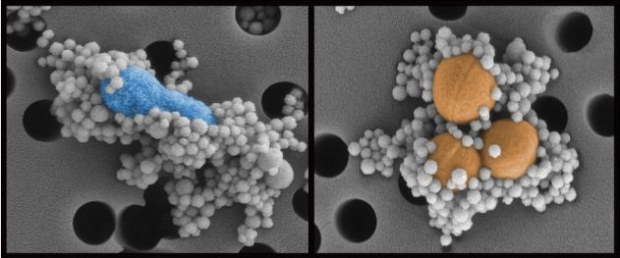A new dialysis machine is inspired by our spleen but is even more effective, clearing the blood of pathogens and limiting infections.
The Wyss Institute of Harvard Medical School is – according to its researchers – one of the most exciting place in which to work. And if we are to judge from this exceptional “spleen artificial” capable of purifying our blood from pathogens – bacteria, viruses, toxins – we can not give them that right.
 If you like writing in Nature Medicine this new process inspired by our dear old spleen is able to remove from the bloodstream is Escherichia Coli as the Ebola, then today is a key date in the yearbooks of medicine. An important date for humanity, to tell the truth: the blood infections, the main target of this project, are a very common cause of death for humans, cut off from sepsis.
If you like writing in Nature Medicine this new process inspired by our dear old spleen is able to remove from the bloodstream is Escherichia Coli as the Ebola, then today is a key date in the yearbooks of medicine. An important date for humanity, to tell the truth: the blood infections, the main target of this project, are a very common cause of death for humans, cut off from sepsis.
The sepsis or septicemia, is a body’s response to the invasion of tissues, fluids and body cavities, multifactorial, resulting from the complex interaction between our body and the pathogen that attacks him. The worst result is the septic shock and multiorgan failure syndrome, which can result in the death of an individual and is extremely dangerous, especially for vulnerable individuals such as children and the elderly.
The infections that cause sepsis are difficult to identify in a timely manner, and are usually fought with antibiotics, which generate a whole series of new problems.
The new procedure
The “artificial spleen”, or ” biospleen “, uses the MBL, a modified form of the lectin which binds to mannose, a sugar that is found in certain specific forms on the outer surface of bacteria, viruses, fungi, plants, and therefore it is extremely useful in targeting the harmful micro-organisms, since there is no free in nature. The MBL also binds to the toxins produced by the bacteria died, which usually trigger the vicious circle of septicemia.
The MBL covers the surface of small “balls” magnetic nanotechnology, and it is these microscopic spheres that bind to pathogens. The spleen artificial magnetically draws bacteria and toxins from the blood, making operation very precise and effective dialysis, returning the clean blood to the patient’s circulation.
Experiments on rats have demonstrated exceptional results, with 89% of the animals survived infection with staphylococci and Escherichia after treatment, compared to a mere 14% of infected individuals not treated with the artificial spleen. This new dialysis was also tested on human blood containing a mixture of pathogens, which can be processed at the rate of one liter per hour.
The cleaned blood from bio spleen makes an organism capable of countering even the worst infections using its own antibodies or antibiotics. Within a couple of years we will be the first clinical trials on human patients.
Leave a Reply